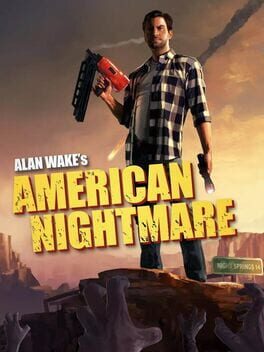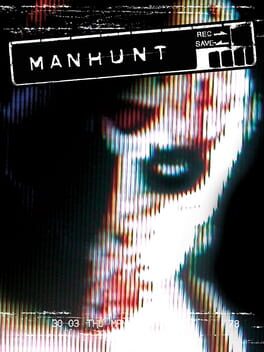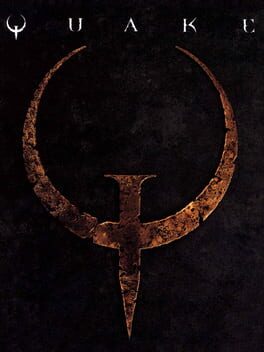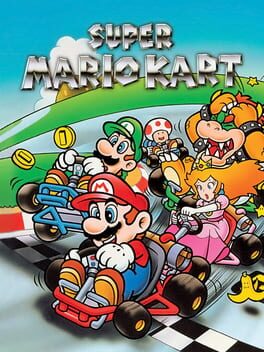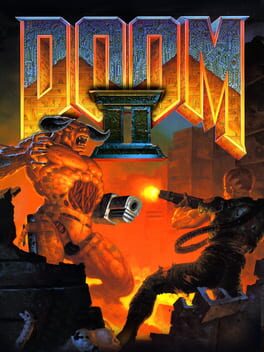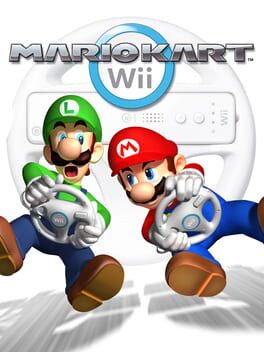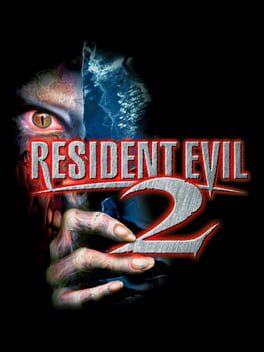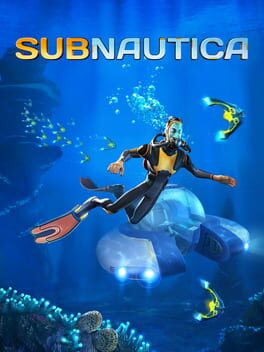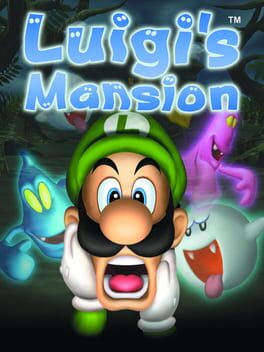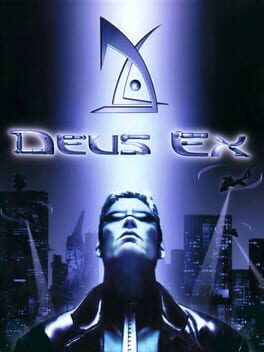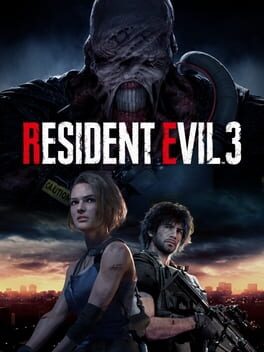Stabbed
If Alan Wake 1 was Twin Peaks' original run, then this is without a doubt The Missing Pieces. The combat is snappier and feels a lot more fun, which is a big step up from the first game, but wow, is the game structure somehow even more thin and repetitive. The way the characters wise up as you continue is a cool touch, but it really doesn't make up for what is essentially 3 fetch quests on repeat.
That being said, I might just say this is worth playing solely for the TV clips. They're fantastic, and easily the best part of this whole game. If Sam Lake had scrapped this entire game and instead made a 2-3 hour film consisting of what he put on the TVs, I'd probably give it a 4.5/5. If you really can't stand the gameplay, just do all the quests once and then watch the clips (and maybe read the manuscript pages) on YouTube, it'll give you what you need to know from this game without making you trudge through repetitive missions.
That being said, I might just say this is worth playing solely for the TV clips. They're fantastic, and easily the best part of this whole game. If Sam Lake had scrapped this entire game and instead made a 2-3 hour film consisting of what he put on the TVs, I'd probably give it a 4.5/5. If you really can't stand the gameplay, just do all the quests once and then watch the clips (and maybe read the manuscript pages) on YouTube, it'll give you what you need to know from this game without making you trudge through repetitive missions.
2003
Manhunt is a game that's always really interested me. I've always had a grim, morbid fascination in the transgressive and controversial, the way the media can make people fear a film or game more than the actual work itself could. When I was younger, I probably had the entire Rockstar history memorized and would spring into a hearty speech about how "games aren't really the problem, it's the people", but you'd never really find me playing any of Rockstar's games; in an ironic reversal, I was just as fixated on the controversy of the material rather than the material itself. Of their entire catalog, Manhunt was the game that piqued my curiosity the most, since the very concept was so boiled down: you just kill people in gruesome ways, no morality tests, no philosophical questions. I played the first few levels when I was 13 or so, and thought I was a real scary edgelord for loving a game where brutality was so rewarded (guess what my favorite fighting games were), but I never really got far in it. I felt satisfied with the couple hours of exposure I got, and I think that feeling hasn't changed for me now, years later.
Manhunt lays its cards on the table early, and lets you know what you're getting into quite clearly: a dark, almost noiresque atmosphere, aided by the gritty PS2 visuals and clearly Carpenter-inspired soundtrack, and the sneering voice of Brian Cox cheering you on as you brutally murder the people in your way. For the first hour or so, it really is effective. The camera angles and quality of the Executions, along with the fluid mocap work, provides a grisly realism that works to unsettle even the most grizzled of horror vets. Combine that with some high-level sound design, and the end result is a spectacle of potently macabre entertainment, but it's not something that lasts.
As with most horror-adjacent media, exposure and desensitization are its Achille's heel. Not only is the arsenal of weapons surprisingly limited, a good third or more of that arsenal aren't available for Executions, and some of the weapons even reuse their Execution animations, which leads to even the most effective kills feeling dull after a couple levels of repeats. Unfortunately, rather than try to "up the ante" and make the game progressively more disturbing, it feels as though the developers completely throw in the towel somewhere around the third act, and turn the game into something more like Max Payne (sans bullet time) or even a "3D Hotline Miami"; the difficulty spikes, stealth is thrown to the wind, and guns become your primary tools against enemies, drying what remained of the atmosphere out completely, and turning it into a repetitive chore as the game gets closer to the finish line. And once you get to that finish line, is there a grand revelation waiting for you? Something that completely changes the context of the game, and perhaps even gives an "explanation" of the savage bloodthirst that you willingly took place in?
No. The antagonist dies, and the game ends with a brief news montage giving a slight bit of depth as to what happened, but never any concrete answers or commentary, which leads me to ask: what was the point? Was this a meta-commentary on how the elites are the real monsters, how police are just as cruel as the sadistic gangs you've been victim to, but society still finds a scapegoat to blame rather than looking at root causes? Is there perhaps an ironic connection between me, the player, never finding out any reasoning for why this all happened, leaving me in the same shoes as the protagonist? Could Rockstar be criticizing themselves, using the antagonist as an obvious stand-in for game developers who revel in the controversy garnered from subjecting the world to gruesome imagery?
Then I remember that this is a game that actively applauds you for performing more sadistic kills, with no cartoonish overexaggeration or a detached "silliness" to the bloodshed, just a jagged realism to everything you see. I believe there is no deeper meaning to be extracted from it. The game is sick, and I'm sick for playing it through to the end.
Manhunt lays its cards on the table early, and lets you know what you're getting into quite clearly: a dark, almost noiresque atmosphere, aided by the gritty PS2 visuals and clearly Carpenter-inspired soundtrack, and the sneering voice of Brian Cox cheering you on as you brutally murder the people in your way. For the first hour or so, it really is effective. The camera angles and quality of the Executions, along with the fluid mocap work, provides a grisly realism that works to unsettle even the most grizzled of horror vets. Combine that with some high-level sound design, and the end result is a spectacle of potently macabre entertainment, but it's not something that lasts.
As with most horror-adjacent media, exposure and desensitization are its Achille's heel. Not only is the arsenal of weapons surprisingly limited, a good third or more of that arsenal aren't available for Executions, and some of the weapons even reuse their Execution animations, which leads to even the most effective kills feeling dull after a couple levels of repeats. Unfortunately, rather than try to "up the ante" and make the game progressively more disturbing, it feels as though the developers completely throw in the towel somewhere around the third act, and turn the game into something more like Max Payne (sans bullet time) or even a "3D Hotline Miami"; the difficulty spikes, stealth is thrown to the wind, and guns become your primary tools against enemies, drying what remained of the atmosphere out completely, and turning it into a repetitive chore as the game gets closer to the finish line. And once you get to that finish line, is there a grand revelation waiting for you? Something that completely changes the context of the game, and perhaps even gives an "explanation" of the savage bloodthirst that you willingly took place in?
No. The antagonist dies, and the game ends with a brief news montage giving a slight bit of depth as to what happened, but never any concrete answers or commentary, which leads me to ask: what was the point? Was this a meta-commentary on how the elites are the real monsters, how police are just as cruel as the sadistic gangs you've been victim to, but society still finds a scapegoat to blame rather than looking at root causes? Is there perhaps an ironic connection between me, the player, never finding out any reasoning for why this all happened, leaving me in the same shoes as the protagonist? Could Rockstar be criticizing themselves, using the antagonist as an obvious stand-in for game developers who revel in the controversy garnered from subjecting the world to gruesome imagery?
Then I remember that this is a game that actively applauds you for performing more sadistic kills, with no cartoonish overexaggeration or a detached "silliness" to the bloodshed, just a jagged realism to everything you see. I believe there is no deeper meaning to be extracted from it. The game is sick, and I'm sick for playing it through to the end.
2023
There are pages upon pages that I could write about this game, how it makes me feel, what it makes me think, and I knew that I would have difficulty putting the pen to paper even before getting halfway through the game. Every turn left me with something to ruminate on, every session leaving me with more spiraling thoughts than the last. I want to keep this as spoiler-free as I can, since I think that this is an experience best had blind as possible, so it may not seem as long or as thorough as I'd like. Maybe I'll make an extended version with spoilers galore, who knows. To make it easier, let me just start with the big statement:
Alan Wake II is a monumental achievement in video games. It is the magnum opus of a team of developers that have worked tirelessly for 20 years to push, expand, bend, and break the boundaries of what the medium of video games can do, before the idea of "the medium of video games" was even a concept in the public consciousness. It carries with it the weight of decades-old Chekhov's guns that have slowly had their hammers pulled back further and further with every new game or expansion under the Remedy name, all firing at the player throughout the story; some of those guns are 9-millimiters, others are 12-gauges. It may seem odd to fixate on the 13 years spent letting this game come to life, but there is an undeniable weight to the fact that it is the culmination of years of buildup, put together piecemeal with every new game in the Remedy catalog, every passing year making it shift and evolve and mutate into a supernova, a point of no return for both Remedy and for AAA games as a whole.
Alan Wake II is a game that needs to exist. It feels like a thunderous wake-up call to every game developer, large and small, to see what can be done with the technology that we're able to create with at this point in time. I'm sure we've all groaned at numerous hardware manufacturers' insistence on "the power and capability of the X" and "the new era of DLSS RTX FSR AA" leaving us with nothing much to think other than "huh, that sure is a game with good graphics", but I must stress that this is not the case when I praise this game's technological feats. The game uses every tool that modern hardware seems capable of to create visually stunning images that sear themselves into your brain, to shift realities with the press of a button, and to blur the line between full-motion video, pre-rendered CGI, and real-time cutscenes; a sleight of hand that could only be achieved if the graphics were clean enough and the transitions smooth enough to make you believe that it was all one continuous story flowing through multiple avenues. Not only does it do all this, but it succeeds in doing this by having exceptional art direction, not one scene or environment feeling generic, with even the most miniscule of details given a touch of love from the game's artists. This is the point that needs to be focused on; it uses this technology to express a clear, but sprawling artistic vision, not the inverse-- that being funneling a vision through the lens of parading technical ability.
The game has been referred to, quite frequently in fact, as the closest video game equivalent to Danielewski's House of Leaves, and I feel as though that is an apt description. As mentioned, I'm avoiding all spoilers in this review, but the way the narrative constantly folds in on itself with deeply postmodern meta references to both in-universe and external details, combined with the overall premise of "a horror story becoming reality", I feel like the comparison is a given. That being said, I wanted to bring it up to succinctly describe how extremely impressive the story is, not just for a video game, but as writing in general. As much as people might like to be reductive ("it's confusing, so people think it's smart!"), it's painfully obvious that creating something like this takes mental power that I, nor most people playing it, could even imagine having. Were it not for this magnificent, expansive, recursive, twisting narrative, then Alan Wake II would indeed be what the detractors call it; a tech demo. However, the art direction being used to bring this story to life is what, in my opinion, completely nullifies any chance at those arguments holding water.
For now, I think I'll leave it here. This is one of the greatest artistic experiences I've ever had the immense pleasure of bearing witness to, and one that I hope will be remembered as this generation's Half-Life 2 in terms of being a high watermark of what can be achieved with the technology that great creative minds can channel their visions through. I firmly believe that if this does not cause a titanic sea change in the field of AAA gaming within the next 5 years, then gaming as a medium will be showing itself to have grown stagnant and comfortable in the expected, in the norm. Every generation needs a game like this to remind us of the power and magnitude that exists within our favorite medium, one that inspires us to follow in its footsteps and create something great ourselves.
Alan Wake II is a monumental achievement in video games. It is the magnum opus of a team of developers that have worked tirelessly for 20 years to push, expand, bend, and break the boundaries of what the medium of video games can do, before the idea of "the medium of video games" was even a concept in the public consciousness. It carries with it the weight of decades-old Chekhov's guns that have slowly had their hammers pulled back further and further with every new game or expansion under the Remedy name, all firing at the player throughout the story; some of those guns are 9-millimiters, others are 12-gauges. It may seem odd to fixate on the 13 years spent letting this game come to life, but there is an undeniable weight to the fact that it is the culmination of years of buildup, put together piecemeal with every new game in the Remedy catalog, every passing year making it shift and evolve and mutate into a supernova, a point of no return for both Remedy and for AAA games as a whole.
Alan Wake II is a game that needs to exist. It feels like a thunderous wake-up call to every game developer, large and small, to see what can be done with the technology that we're able to create with at this point in time. I'm sure we've all groaned at numerous hardware manufacturers' insistence on "the power and capability of the X" and "the new era of DLSS RTX FSR AA" leaving us with nothing much to think other than "huh, that sure is a game with good graphics", but I must stress that this is not the case when I praise this game's technological feats. The game uses every tool that modern hardware seems capable of to create visually stunning images that sear themselves into your brain, to shift realities with the press of a button, and to blur the line between full-motion video, pre-rendered CGI, and real-time cutscenes; a sleight of hand that could only be achieved if the graphics were clean enough and the transitions smooth enough to make you believe that it was all one continuous story flowing through multiple avenues. Not only does it do all this, but it succeeds in doing this by having exceptional art direction, not one scene or environment feeling generic, with even the most miniscule of details given a touch of love from the game's artists. This is the point that needs to be focused on; it uses this technology to express a clear, but sprawling artistic vision, not the inverse-- that being funneling a vision through the lens of parading technical ability.
The game has been referred to, quite frequently in fact, as the closest video game equivalent to Danielewski's House of Leaves, and I feel as though that is an apt description. As mentioned, I'm avoiding all spoilers in this review, but the way the narrative constantly folds in on itself with deeply postmodern meta references to both in-universe and external details, combined with the overall premise of "a horror story becoming reality", I feel like the comparison is a given. That being said, I wanted to bring it up to succinctly describe how extremely impressive the story is, not just for a video game, but as writing in general. As much as people might like to be reductive ("it's confusing, so people think it's smart!"), it's painfully obvious that creating something like this takes mental power that I, nor most people playing it, could even imagine having. Were it not for this magnificent, expansive, recursive, twisting narrative, then Alan Wake II would indeed be what the detractors call it; a tech demo. However, the art direction being used to bring this story to life is what, in my opinion, completely nullifies any chance at those arguments holding water.
For now, I think I'll leave it here. This is one of the greatest artistic experiences I've ever had the immense pleasure of bearing witness to, and one that I hope will be remembered as this generation's Half-Life 2 in terms of being a high watermark of what can be achieved with the technology that great creative minds can channel their visions through. I firmly believe that if this does not cause a titanic sea change in the field of AAA gaming within the next 5 years, then gaming as a medium will be showing itself to have grown stagnant and comfortable in the expected, in the norm. Every generation needs a game like this to remind us of the power and magnitude that exists within our favorite medium, one that inspires us to follow in its footsteps and create something great ourselves.
1996
1992
I'm giving this a generous score since I did mildly abuse rewind in my emulator, because wow does this game fall off badly. The Mushroom Cup is genuinely great fun, lightweight but doesn't feel too finnicky. The other three are trainwrecks for me, a deadly mixture of clunky controls and aggravating map design. Oh, and I've genuinely never seen AI that cheats as blatantly as whoever is in 1st and 2nd place in front of you; literal constant Power Stars.
That being said, it is charming. It's nice to see what's essentially the codifier of kart racing games, the music is pretty sweet, the animations are cute, and it does have some fun moments (again, mostly in the Mushroom Cup). Unfortunately, it's just not enough to outweigh my personal gripes with the game.
That being said, it is charming. It's nice to see what's essentially the codifier of kart racing games, the music is pretty sweet, the animations are cute, and it does have some fun moments (again, mostly in the Mushroom Cup). Unfortunately, it's just not enough to outweigh my personal gripes with the game.
Alright fine, I've been won over. This one kicks ass, and yeah, it's better than 1. I think 1 has a simplicity to it that I really love, but god the highs in this are some of the best the FPS genre has to offer. Completely shifts the focus of the first game being tight arcade-y levels with surgical enemy placement to throwing you headfirst into the grinder, whole fields of enemies that are as eager to shred you as you are to them. I wish I could rank this game even higher, because I really do love it and what it stands for, but the low parts in this feel torturous. Nothing in 1 comes close to the pain of trudging through Downtown or The Chasm or Bloodfalls. But, also, nothing in 1 comes close to slaughtering through The Spirit World or Nirvana or The Courtyard or Dead Simple or
You get the point.
You get the point.
2008
Unless 8 blows me away, this is the best one, for sure. All 16 new courses are all fantastic, not a single dull moment among the bunch, and the retro tracks aren't snoozers, either. The trick system is, of course, brilliant, combined with the focus on drifting thanks to the easier controls and new bikes, and you've got one of the most consistently fun games I can think of. Anyone who writes the praise for this game off as nostalgia is being intentionally pig-headed, you can feel how great this is as soon as you start your first race. The only Mario Kart game so far where I've actively wanted to unlock everything manually, rather than begrudgingly acquiescing or just cheating it in. Absolutely deserves the hype.
1998
Undoubtedly a good game on its own, but playing it right after REmake, I only had one thought going through my head: "Wow, I'd rather be playing either REmake or RE2make than this." Yes, I know it's iconic, and helped cement the series' fame. It introduced multiple fan favorite characters, it has the setting that a lot of people think of when they think RE, it added some new terrifying enemies, but... I don't know. At the end of the day, it didn't feel like it was trying to do anything more than just be "more Resident Evil." It didn't feel nearly as tense as 1 due to the more action-oriented focus of the development, which hinders the game in numerous ways. Fixed camera angles and tank controls worked perfectly in RE1 to create tension and dread, but in this, they feel like a nuisance that heavily impacts combat for the worse. In fact, when you're equipped to the nines with weaponry, it robs the experience of a lot of its scariness. Zombies and Lickers aren't threats to me anymore, they're just annoyingly tanky targets.
The story is never really the focal point in an RE game, but a lot of people cite RE2 as having the best story in the series, so I paid closer attention for this one, and... it's just RE1. Like, almost exactly. The RPD is a cover for Umbrella, just like the mansion. Someone who the main character trusts turns out to be the villain, just like before. The game ends with the Umbrella labs self-destruc- well, okay, fine, every RE game ends that way. But still, it didn't really feel like the plot was all that different from RE1's. Sure, having the two main characters bump into each other a few times is definitely pretty cool and creates a more cohesive through line, but at its core, it feels samey.
I should note that these are my thoughts after only completing Leon's A campaign, just like how I did my RE2make review. Once I do Claire B, I'll come back and give any final thoughts; see I warm up to this any more.
Alright, so I just finished Claire B, and my feelings are pretty enforced now. The early game is still more irritating than it is tense, but the action focus really works later on in the game. It just feels cool to run through Umbrella Labs, blasting away everything you see with electricity guns and acid grenades. I gotta say, though, I was expecting a lot more from the way the game's perspective changes on a B scenario. It's still 85% the same game, with the same items, and same rooms, with only some minor changes in how you get from room 1 to room 2. Mr. X was a huge letdown, he really just felt shoehorned in than a natural addition. Also, Sherry is incredibly annoying as a companion and made it hard for me to really feel her and Claire's friendship like I did in the remake.
In the end, this is a good game that, while I'm grateful it exists for making the RE series the mainstay that it is today, I feel hasn't aged as good as its peers in the series. Between both the RE1 and RE2 remakes, I don't find much reason to go back to this one. I can imagine it being mind-blowing back in '98, but now, it just feels outmoded.
The story is never really the focal point in an RE game, but a lot of people cite RE2 as having the best story in the series, so I paid closer attention for this one, and... it's just RE1. Like, almost exactly. The RPD is a cover for Umbrella, just like the mansion. Someone who the main character trusts turns out to be the villain, just like before. The game ends with the Umbrella labs self-destruc- well, okay, fine, every RE game ends that way. But still, it didn't really feel like the plot was all that different from RE1's. Sure, having the two main characters bump into each other a few times is definitely pretty cool and creates a more cohesive through line, but at its core, it feels samey.
I should note that these are my thoughts after only completing Leon's A campaign, just like how I did my RE2make review. Once I do Claire B, I'll come back and give any final thoughts; see I warm up to this any more.
Alright, so I just finished Claire B, and my feelings are pretty enforced now. The early game is still more irritating than it is tense, but the action focus really works later on in the game. It just feels cool to run through Umbrella Labs, blasting away everything you see with electricity guns and acid grenades. I gotta say, though, I was expecting a lot more from the way the game's perspective changes on a B scenario. It's still 85% the same game, with the same items, and same rooms, with only some minor changes in how you get from room 1 to room 2. Mr. X was a huge letdown, he really just felt shoehorned in than a natural addition. Also, Sherry is incredibly annoying as a companion and made it hard for me to really feel her and Claire's friendship like I did in the remake.
In the end, this is a good game that, while I'm grateful it exists for making the RE series the mainstay that it is today, I feel hasn't aged as good as its peers in the series. Between both the RE1 and RE2 remakes, I don't find much reason to go back to this one. I can imagine it being mind-blowing back in '98, but now, it just feels outmoded.
1994
"i don like this :(" - what my friend wanted me to make my review
Sorry, Goose, but I actually have a lot more to say about this. After giving up on this and beating MOTHER 3 and 1, I decided it was only fair to come back and finish it. I came in with a fresh mind, and was really hoping I would like it as much as everyone else does, but sadly, that just isn't the case.
I'll start with the positives: it's very charming! The reputation it's built up for being very quirky and funny is definitely deserved, there were double-digits times I found myself laughing at a gag or throwaway line, and I think more jokes landed than flopped, which is impressive considering just how many there are. The art style is very striking and creative, it makes the little details like the towns' buildings more memorable and the party members' designs simply iconic, though the peak is the final boss without a doubt. While I personally don't like the SNES soundfont, I do like a majority of the songs from the MOTHER 1 soundtrack that were touched up (e.g. the shop theme) and the two final boss themes are just fantastic, the last being one of my favorite songs in video games. However, that's about all I can say for positives, although the charm is definitely a major part of the game.
The biggest negative I have is the gameplay. Underneath its silly, surreal syrup of style, the RPG that lies at the core is pretty weak. The rolling numbers are a nice addition, but I find that a majority of the time they roll too quickly to the point of being useless, with party members already dead before the healing text box popped up. Too many fights are just A-button mashing with next to zero actual strategizing, ESPECIALLY once Jeff gets his late game bottle rocket collection. Even when you can't bash an enemy to death, I found that Paula and Poo's (and, when necessary, Ness's) PSI attacks rendered most foes dead within the first round, and even if it went on longer, it felt like more of a nuisance than a real fight. Not only the gameplay, but I find that the characters and world are much less interesting than either of its two sibling games, and even on its own, it lacks in that department. What is Paula's character outside of "she's nice to Ness and has psychic powers"? I know it's a lot to ask a SNES-era game to have incredibly compelling characters, but when a major ending plot point is reliant on the fact that you care about them, it feels cheap to ask that when you haven't given me enough to care about. As for the world itself, I just don't find it particularly interesting. It's neat to look at it now, nearly 30 years later, and see just how much of it is a time capsule of an exact era in American culture, but that's about all I feel, the world feels much more disjointed and segmented than I'd want it to.
Rating this game is admittedly very difficult for me, because I don't feel like a 5/10 is correct, but I don't know what to rate it. I think, for what it's worth, it's aged decently. Sure, the menuing is painfully clunky and the console lag can be insufferable at times, but it's not terrible and still very much playable, though I think the amount of slow-scrolling text boxes during battle can certainly start to wear one's patience thin. The gameplay is not great, but the style and vibe of the game definitely wins me over and is what kept me playing until the end, even if the ending was more of a let down for me than anything. I feel near equal parts positive and negative things about this game, and it evens out to a resounding shrug of an experience. I'm glad I played it, and I think its influence on the world of gaming has been more of a good thing than a bad thing, but it's not one I can see myself coming back to, nor is it one I can even see myself recommending.
Sorry, Goose, but I actually have a lot more to say about this. After giving up on this and beating MOTHER 3 and 1, I decided it was only fair to come back and finish it. I came in with a fresh mind, and was really hoping I would like it as much as everyone else does, but sadly, that just isn't the case.
I'll start with the positives: it's very charming! The reputation it's built up for being very quirky and funny is definitely deserved, there were double-digits times I found myself laughing at a gag or throwaway line, and I think more jokes landed than flopped, which is impressive considering just how many there are. The art style is very striking and creative, it makes the little details like the towns' buildings more memorable and the party members' designs simply iconic, though the peak is the final boss without a doubt. While I personally don't like the SNES soundfont, I do like a majority of the songs from the MOTHER 1 soundtrack that were touched up (e.g. the shop theme) and the two final boss themes are just fantastic, the last being one of my favorite songs in video games. However, that's about all I can say for positives, although the charm is definitely a major part of the game.
The biggest negative I have is the gameplay. Underneath its silly, surreal syrup of style, the RPG that lies at the core is pretty weak. The rolling numbers are a nice addition, but I find that a majority of the time they roll too quickly to the point of being useless, with party members already dead before the healing text box popped up. Too many fights are just A-button mashing with next to zero actual strategizing, ESPECIALLY once Jeff gets his late game bottle rocket collection. Even when you can't bash an enemy to death, I found that Paula and Poo's (and, when necessary, Ness's) PSI attacks rendered most foes dead within the first round, and even if it went on longer, it felt like more of a nuisance than a real fight. Not only the gameplay, but I find that the characters and world are much less interesting than either of its two sibling games, and even on its own, it lacks in that department. What is Paula's character outside of "she's nice to Ness and has psychic powers"? I know it's a lot to ask a SNES-era game to have incredibly compelling characters, but when a major ending plot point is reliant on the fact that you care about them, it feels cheap to ask that when you haven't given me enough to care about. As for the world itself, I just don't find it particularly interesting. It's neat to look at it now, nearly 30 years later, and see just how much of it is a time capsule of an exact era in American culture, but that's about all I feel, the world feels much more disjointed and segmented than I'd want it to.
Rating this game is admittedly very difficult for me, because I don't feel like a 5/10 is correct, but I don't know what to rate it. I think, for what it's worth, it's aged decently. Sure, the menuing is painfully clunky and the console lag can be insufferable at times, but it's not terrible and still very much playable, though I think the amount of slow-scrolling text boxes during battle can certainly start to wear one's patience thin. The gameplay is not great, but the style and vibe of the game definitely wins me over and is what kept me playing until the end, even if the ending was more of a let down for me than anything. I feel near equal parts positive and negative things about this game, and it evens out to a resounding shrug of an experience. I'm glad I played it, and I think its influence on the world of gaming has been more of a good thing than a bad thing, but it's not one I can see myself coming back to, nor is it one I can even see myself recommending.
2014
Talking about this game is a little difficult for me because I've never played it alone (extreme fear of the ocean), so I've always had to have friends holding my hand through it. Now, I'll be honest and say the infamous "Open World Survival Crafting Sometimes-Horror Early Access Available Now On Steam For $30 (But More Content Will Be Added In The Future)" genre is at the bottom of my interests, and I was put off at the game's mechanics at first, but all of those expectations and prejudices are completely shot down within the first hour.
Subnautica has such a unique and exceptionally thought-out alien world, with the designs of the creatures, the natural formations, even the man-made structures never really feeling like our world, what we're used to. The developers use those differences to put you in a very clear and distinct position that affects the game's tone as well as affects how you play the game: you are not the top of the food chain. It's textbook for games like this to have enemies that are bigger, meaner, tougher than the player so that there's some form of obstacle to overcome, but the challenges that Subnautica offers often don't point towards that solution. Your solution, most of the time, is to let nature be. You're in an ocean with creatures tens, hundreds times bigger than you; in the game's context, you are prey rather than just "an enemy." It creates a very unique symbiosis with the world, where you grow to feel like a part of the ecosystem, rather than an invasive species.
The game also has a fair amount of pull due to its narrative. I went into this expecting "Minecraft in the ocean with scary monsters", but I was shocked to find that there is a surprisingly compelling story, with lore found through scanning through the things you come across and putting the pieces together. I won't say a thing about the story here because Subnautica is full of so many fun surprises I would hate to spoil, but a certain moment a few hours into the game (anyone who's played knows what I'm talking about) is such a massive right hook that immediately grabs your attention and slaps you for thinking this was going to be "just another survival game."
Now, I do have to say my major qualm with the game also comes from this narrative I'm praising: the pacing. I won't blame the developers on this, since I feel like pacing a story in a game where the player is free to do whatever they like at whatever pace they please is probably impossible, but I do feel like it perhaps shows its cards a little bit too early, and leads to long stretches of having to do a lot of hunting and gathering just to make one single step forward in the story. Of course, that does inspire you to explore and learn the land more, which is smart, but... it feels weird saying the story is so interesting that it makes the gameplay feel uninteresting as a result, but that's what I'm saying. Also, while it is a bit nitpicky, I found that some enemies in a couple major biomes were a massive pain in the neck, and led to me feeling less terrified and more annoyed. To any game dev reading this, please never make a creature that moves you around from one place to another, it's incredibly disorienting and frustrating, and not in a good way.
Overall, if things were tightened just a bit more, and if the ending didn't feel like a footnote (again, this could've been affected by me being a chronic hoarder in these games), I feel like I'd like this game even more. But, as it stands, it is such a creative and lush experience that my problems don't bring the game down as a whole. I recommend it to anyone who has a fear of the ocean, you'll come out of it loving the ocean more and simultaneously never being more afraid of it.
Subnautica has such a unique and exceptionally thought-out alien world, with the designs of the creatures, the natural formations, even the man-made structures never really feeling like our world, what we're used to. The developers use those differences to put you in a very clear and distinct position that affects the game's tone as well as affects how you play the game: you are not the top of the food chain. It's textbook for games like this to have enemies that are bigger, meaner, tougher than the player so that there's some form of obstacle to overcome, but the challenges that Subnautica offers often don't point towards that solution. Your solution, most of the time, is to let nature be. You're in an ocean with creatures tens, hundreds times bigger than you; in the game's context, you are prey rather than just "an enemy." It creates a very unique symbiosis with the world, where you grow to feel like a part of the ecosystem, rather than an invasive species.
The game also has a fair amount of pull due to its narrative. I went into this expecting "Minecraft in the ocean with scary monsters", but I was shocked to find that there is a surprisingly compelling story, with lore found through scanning through the things you come across and putting the pieces together. I won't say a thing about the story here because Subnautica is full of so many fun surprises I would hate to spoil, but a certain moment a few hours into the game (anyone who's played knows what I'm talking about) is such a massive right hook that immediately grabs your attention and slaps you for thinking this was going to be "just another survival game."
Now, I do have to say my major qualm with the game also comes from this narrative I'm praising: the pacing. I won't blame the developers on this, since I feel like pacing a story in a game where the player is free to do whatever they like at whatever pace they please is probably impossible, but I do feel like it perhaps shows its cards a little bit too early, and leads to long stretches of having to do a lot of hunting and gathering just to make one single step forward in the story. Of course, that does inspire you to explore and learn the land more, which is smart, but... it feels weird saying the story is so interesting that it makes the gameplay feel uninteresting as a result, but that's what I'm saying. Also, while it is a bit nitpicky, I found that some enemies in a couple major biomes were a massive pain in the neck, and led to me feeling less terrified and more annoyed. To any game dev reading this, please never make a creature that moves you around from one place to another, it's incredibly disorienting and frustrating, and not in a good way.
Overall, if things were tightened just a bit more, and if the ending didn't feel like a footnote (again, this could've been affected by me being a chronic hoarder in these games), I feel like I'd like this game even more. But, as it stands, it is such a creative and lush experience that my problems don't bring the game down as a whole. I recommend it to anyone who has a fear of the ocean, you'll come out of it loving the ocean more and simultaneously never being more afraid of it.
2001
A cute and charming Nintendo take on the ever-popular Resident Evil aimed at kids. It gives Luigi a character, which I like, and some of the puzzles here are there are neat, but overall this just felt repetitive to me. The gameplay loop of "knock on thing, ghost pops out, press R and wiggle stick" got old very quickly, especially in the final third of the game. I also severely struggled with the controls due to the odd perspective; I might go and play the 3DS remake to see if that helps my eyes a bit more. Great sound design all around, though, which is a weird compliment I didn't expect I'd make, but hey. Like I said, it's very charming, even if I personally didn't really care for the end result.
Goddamn, this is impossible to rate. I had an hour long talk with my friend after finishing this, because of how much I felt about the overall scope. After a long time of juggling and thinking... yeah, this is a 5. And there's little more you can say.
A game of this magnitude, of this level of quality, I feel like it's impossible to really dislike outside of your own personal taste not matching up (which, of course, is entirely valid). There's so much to say, so much to write about, so much to think about, that I feel like I'd be writing this review for as long as it took me just to play it. I guess I'll note down some of the major points.
- Arthur Morgan is one of the best protagonists in any media ever. This has already been said, but you need to hear it again. He really is that good. The feeling I got when he would talk and interact with other people, other camp members, it was like watching a friend that I'd known my entire life.
- Yes, the game suffers from Rockstar syndrome, and it starts to get at you around halfway through. Repetitive missions that can be boiled down to "start at point A, go to point B, talk to people, shoot people, go to point C or back to point A." However, in a paradoxical situation, it's a story that I feel couldn't have gone to any other studio. No one can make such vast open worlds like Rockstar can, and that's what gives this game the longevity in my eyes, which leads into...
- Holy lord, the world. I don't love Western settings that much (despite loving Fallout: New Vegas), but the natural beauty that feels so real rather than created, the flowing streams and roaming wildlife, the dynamic weather patterns that affect how said wildlife and other people interact, it feels like such an in-depth snapshot of a world that came before us instead of a generic, shallow recreation.
- The emphasis on realism allowing for a more immersive feeling throughout the game, while never being intrusive to the player, only advising you play more delicately and less recklessly. Your horses can die and you lose all your bonding, you can gain or lose weight depending on your eating habits, you can't magically grow your hair back like in GTA; once it's cut, you have to grow it back out, shops will treat you poorly if you're a known bad person. Granted, some might see the constant omniscient honor system as being immersion-breaking, but... c'mon, there had to be something to prevent you from being constantly evil.
And a whole bunch of other stuff that would probably go into spoiler territory, and as much as I'd like to, Backloggd won't let you spoiler-tag certain areas, so until then, this'll be the review as is. If you're a fan of open world games, play this. If you're a fan of rich, real, immersive stories, play this. Don't let the studio fool you, this is not a humorous or satirical game at all (for the most part), it is a beautifully crafted Western epic that will go down in the history books as a masterpiece of game design.
A game of this magnitude, of this level of quality, I feel like it's impossible to really dislike outside of your own personal taste not matching up (which, of course, is entirely valid). There's so much to say, so much to write about, so much to think about, that I feel like I'd be writing this review for as long as it took me just to play it. I guess I'll note down some of the major points.
- Arthur Morgan is one of the best protagonists in any media ever. This has already been said, but you need to hear it again. He really is that good. The feeling I got when he would talk and interact with other people, other camp members, it was like watching a friend that I'd known my entire life.
- Yes, the game suffers from Rockstar syndrome, and it starts to get at you around halfway through. Repetitive missions that can be boiled down to "start at point A, go to point B, talk to people, shoot people, go to point C or back to point A." However, in a paradoxical situation, it's a story that I feel couldn't have gone to any other studio. No one can make such vast open worlds like Rockstar can, and that's what gives this game the longevity in my eyes, which leads into...
- Holy lord, the world. I don't love Western settings that much (despite loving Fallout: New Vegas), but the natural beauty that feels so real rather than created, the flowing streams and roaming wildlife, the dynamic weather patterns that affect how said wildlife and other people interact, it feels like such an in-depth snapshot of a world that came before us instead of a generic, shallow recreation.
- The emphasis on realism allowing for a more immersive feeling throughout the game, while never being intrusive to the player, only advising you play more delicately and less recklessly. Your horses can die and you lose all your bonding, you can gain or lose weight depending on your eating habits, you can't magically grow your hair back like in GTA; once it's cut, you have to grow it back out, shops will treat you poorly if you're a known bad person. Granted, some might see the constant omniscient honor system as being immersion-breaking, but... c'mon, there had to be something to prevent you from being constantly evil.
And a whole bunch of other stuff that would probably go into spoiler territory, and as much as I'd like to, Backloggd won't let you spoiler-tag certain areas, so until then, this'll be the review as is. If you're a fan of open world games, play this. If you're a fan of rich, real, immersive stories, play this. Don't let the studio fool you, this is not a humorous or satirical game at all (for the most part), it is a beautifully crafted Western epic that will go down in the history books as a masterpiece of game design.
2000
If I could describe this game in one word, it would be overstated. Not necessarily overrated, because I do think it's earned its praise, but overstated because I think people blow some of the features out of proportion. The RPG elements are really only effective in regards to your shooting, the openness is not quite as limitless as you'd expect, and I don't think this game is as "prophetic" as people say it is. I'm sure you lot all agree, but I get a special thorn in my side whenever I read a comment that says something along the likes of "this is the real world we're living in!!!!" That's not to say it's not incredibly impressive with how much it got right; aside from a certain billionaire's recent escapades with a certain social media site perfectly replicating the main antagonist, the constant paranoia and unease of a post-Patriot Act world is captured excellently to an almost unsettling degree. The miasma of disbelief whenever you talk to a new person as the game continues is a good example of the game's greatest strength: its immersion. Finding a code for a locked door by thoroughly searching a room you merely glazed over before. Talking to people to get information that contradicts what you've heard before, making you want to double-check all the facts you've been given. Listening to some banging ambient techno background music to really get yourself in that cyberpunk mindset. Despite how much Deus Ex uses these tricks, they somehow never get old, and still feel satisfying to be a part of. There's a constant feeling of everything you're doing being your way of doing things that just... really clicks with me. It's hard to explain, it just makes you feel like you're actually doing something in the world.
It has a couple hefty flaws, the biggest one being how awful the AI is. I know it was 2000, but jesus are the enemies ever inconsistent. Barrel at them down a hallway at mach 4 with a rocket launcher in your hands and they'll barely blink, accidentally drop a knife 3 rooms away from them and they'll hone in on your location like they had wallhacks. The combat itself isn't terribly great, with unupgraded weapons being practically impossible to use, though it does make it more satisfying when you finally get the skill points to properly use a gun you want. Not that any of that even matters because combat is effectively disabled about a third through the game with a saddeningly powerful melee weapon that renders pretty much every bullet weapon completely obsolete. In general, this game's strengths very clearly lie in its world, freedom, and immersion rather than its combat, and it really shows in some areas.
Overall, I enjoyed playing this. Some areas were a little too grindy (the final boss battle really leaves a bad taste in your mouth), but nearly all of the levels in this are phenomenally designed, especially near the back half of the game. I don't see myself coming back for a replay any time soon, but I can definitely see it happen in the future when I need a refresher on how immersive games can really be. JC Denton, my beloved.
It has a couple hefty flaws, the biggest one being how awful the AI is. I know it was 2000, but jesus are the enemies ever inconsistent. Barrel at them down a hallway at mach 4 with a rocket launcher in your hands and they'll barely blink, accidentally drop a knife 3 rooms away from them and they'll hone in on your location like they had wallhacks. The combat itself isn't terribly great, with unupgraded weapons being practically impossible to use, though it does make it more satisfying when you finally get the skill points to properly use a gun you want. Not that any of that even matters because combat is effectively disabled about a third through the game with a saddeningly powerful melee weapon that renders pretty much every bullet weapon completely obsolete. In general, this game's strengths very clearly lie in its world, freedom, and immersion rather than its combat, and it really shows in some areas.
Overall, I enjoyed playing this. Some areas were a little too grindy (the final boss battle really leaves a bad taste in your mouth), but nearly all of the levels in this are phenomenally designed, especially near the back half of the game. I don't see myself coming back for a replay any time soon, but I can definitely see it happen in the future when I need a refresher on how immersive games can really be. JC Denton, my beloved.
2020
PLEASE NOTE: I HAVE NOT PLAYED THE ORIGINAL! I'm basing this off of my experience with this game alone, not how it functions as a remake. I may play the original and realize how upsetting this game is, sure, but for now, I'm writing this solely based on the remake alone.
This game is really hard to rate, because I truly don't fully know how to feel about this. There's a lot going for this, and a lot taken away. I'll start with the bad.
Holy shit, the game is short. We all know it is, everyone talks about it, but it's such an elephant-in-the-room problem that you can't ignore it. You can beat the game in around 5 hours and then have nowhere to go from there. There's no 2nd character, there's no extra game modes (outside of the difficulties), there's nothing. The dodge mechanic, while lore-friendly in regards to Jill's character, has frustratingly poor feedback; you get no real information from the game on whether or not you pulled it off right outside of it succeeding or failing. The villain was painfully obvious from the second he came on-screen, and I found a lot of the dialogue in regards to his motivations way, way too on the nose. A smaller complaint, but I felt like there were one too many instakill attacks, which just caused irritation rather than fear.
Now with that all out of the way...
OH MY GOOOOOOOOOOD NEMESIS IS SO COOL HE'S SO BIG AND SCARY AND HE SAYS STARS AAAAAAA HE'S AWESOME
Even though he is a peg down in terms of gameplay from his predecessor Mr. X, he brings tenfold the amount of style and scariness. He's a giant fucking mutant who whips you around with his tentacles and constantly screams the name of your platoon, how cool is that??? Outside of Nemesis, Jill and Carlos make for an excellent dual-protagonist story, each one having what the other doesn't. The gunplay is just as silky smooth as RE2, with the added bonus of Carlos having an AR, which just makes things a lot more fun; you never really get the chance to spray-and-pray outside of him. The sound design is still top-notch, the area near the beginning with the bug-mutants and fleshy walls will probably make me shudder until the day I die. Plus, all the boss fights were insanely fun, even if they didn't have the best feedback. There's such a sense of scale to all of them that makes them incredibly memorable to me.
Overall, this game is style over substance. If you want something more similar to RE2's blend of gameplay and story, then this will definitely let you down. If you want a more cinematic, "playable action movie" type game, then this is absolutely up your alley. They really tried to make this game feel like a playable movie rather an outright video game like RE2, and while I can see why people dislike that from a game sense, I still think it provided a great experience that I won't be soon forgetting.
This game is really hard to rate, because I truly don't fully know how to feel about this. There's a lot going for this, and a lot taken away. I'll start with the bad.
Holy shit, the game is short. We all know it is, everyone talks about it, but it's such an elephant-in-the-room problem that you can't ignore it. You can beat the game in around 5 hours and then have nowhere to go from there. There's no 2nd character, there's no extra game modes (outside of the difficulties), there's nothing. The dodge mechanic, while lore-friendly in regards to Jill's character, has frustratingly poor feedback; you get no real information from the game on whether or not you pulled it off right outside of it succeeding or failing. The villain was painfully obvious from the second he came on-screen, and I found a lot of the dialogue in regards to his motivations way, way too on the nose. A smaller complaint, but I felt like there were one too many instakill attacks, which just caused irritation rather than fear.
Now with that all out of the way...
OH MY GOOOOOOOOOOD NEMESIS IS SO COOL HE'S SO BIG AND SCARY AND HE SAYS STARS AAAAAAA HE'S AWESOME
Even though he is a peg down in terms of gameplay from his predecessor Mr. X, he brings tenfold the amount of style and scariness. He's a giant fucking mutant who whips you around with his tentacles and constantly screams the name of your platoon, how cool is that??? Outside of Nemesis, Jill and Carlos make for an excellent dual-protagonist story, each one having what the other doesn't. The gunplay is just as silky smooth as RE2, with the added bonus of Carlos having an AR, which just makes things a lot more fun; you never really get the chance to spray-and-pray outside of him. The sound design is still top-notch, the area near the beginning with the bug-mutants and fleshy walls will probably make me shudder until the day I die. Plus, all the boss fights were insanely fun, even if they didn't have the best feedback. There's such a sense of scale to all of them that makes them incredibly memorable to me.
Overall, this game is style over substance. If you want something more similar to RE2's blend of gameplay and story, then this will definitely let you down. If you want a more cinematic, "playable action movie" type game, then this is absolutely up your alley. They really tried to make this game feel like a playable movie rather an outright video game like RE2, and while I can see why people dislike that from a game sense, I still think it provided a great experience that I won't be soon forgetting.
